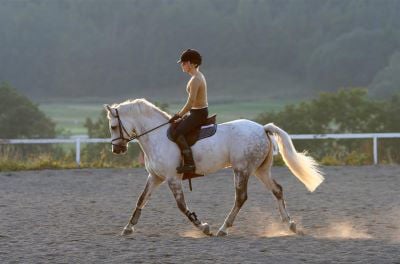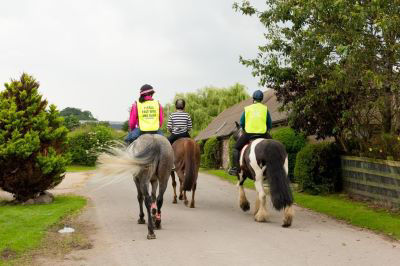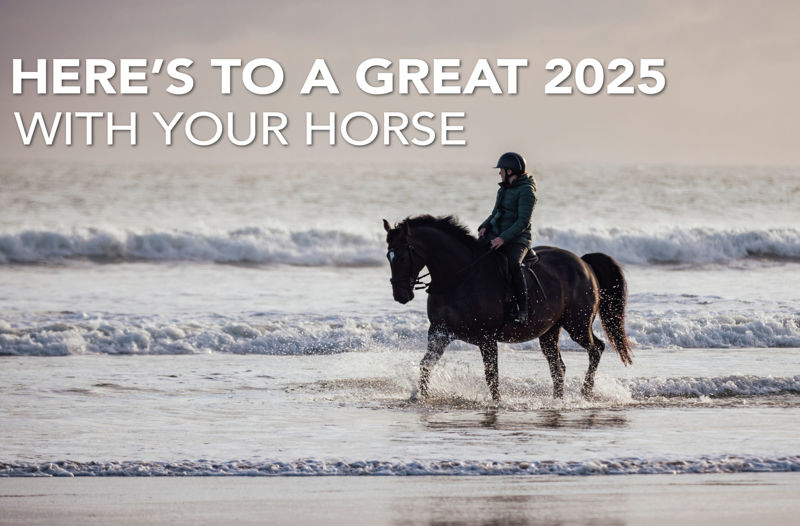Hopefully, you’ve had a great Christmas. The problem is that a great Christmas often leaves you feeling as if you’ve been a little self-indulgent. But never mind, you can put that right with some New Year resolutions for you and your horse.
STOP RIGHT THERE. New Year resolutions are fine in principle, but in practice, they’re more likely to make for a miserable February. By then, we realise that we set targets we can’t meet and feel guiltier than we did in the first place – though if you managed it last year, please let us know because we’d love to hear what you achieved.
Instead, let’s give ourselves some aims. Even if we don’t meet all of them all of the time, a nudge in the right direction will help us and our horses. Here are a few suggestions; perhaps you can add to them.

1. Ride regularly.
Don’t fall into the “I haven’t got time” trap just because some days, you have to make it short and sweet. Experts say it’s better to work a horse for 20 minutes most days than to just ride at weekends, because it keeps him (and you) ticking over physically and mentally.
You might only be able to hack at weekends until the clocks go forward, but you can achieve a lot in the ten minutes left after you’ve allowed five minutes each for warming up and cooling down. Just pick one thing to work on; improving his response to your aids, riding accurate figures, achieving a rhythm over trotting poles. Don’t expect perfection, but do appreciate an improvement.
2. Warm up before you ride.
Walk on the spot for a couple of minutes, shrug your shoulders and do some gentle stretches, with the emphasis on gentle. You’ll ride better from the moment you get on.
3. Keep the basics solid.
One of the wisest trainers I’ve ever met reckons all schooling problems come down to the same things – the horse isn’t going forward, isn’t in a rhythm, isn’t straight – or all three. It’s all too easy to get caught up with the twiddly bits, like lateral work or jumping, and forget the basics: especially if you work on your own most of the time.
4. Build or reinforce your support network.
We all need help, from friends or family who will bring in our horse if we’re battling flu to those who will encourage us when we think we’re not getting anywhere. We all focus on what we need to improve, but we also tend to forget how far we’ve come. When you’re worried that your novice horse can’t maintain his canter rhythm, it just takes someone to point out that a few weeks ago, he could barely canter at all.
5. Don’t stereotype yourself.
Above all, don’t say disparagingly that you’re “just a happy hacker”. Hacking out safely and happily demands a horse and rider who are confident in each other and can cope with all sorts of different challenges. That’s a real achievement.

6. Look at your horse.
You might see him every day, but do you really look at him? Do you check his weight fortnightly with a weigh tape? Do you know him well enough to tell when he’s dozing and when he’s tired, bored or off-colour?
7. Don’t wear blinkers.
We live in an age of discovery, especially in the fields of veterinary medicine and nutrition. You don’t have to incorporate every new idea, but give yourself the chance to think about it and, if necessary, ask advice from a qualified specialist in that field.
To get advice on all things diet and nutrition please feel free to reach out to our wonderful nutrition team here >
8. Most importantly - have fun.
Although you may question it when your horse loses yet another shoe, or when you've got no choice but to poo pick during a gale, we do it because we love it. In the end, there's nothing better than going for a ride, or simply spending time with these animals, that I know many of us will call our best friends.


